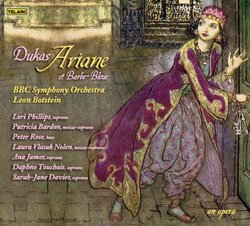| All Artists: Leon Botstein, BBC Symphony Orchestra, Lori Phillips, Peter Rose, Patricia Bardon Title: Dukas: Ariane et Barbe-Bleue Members Wishing: 0 Total Copies: 0 Label: Telarc Original Release Date: 1/1/2007 Re-Release Date: 7/24/2007 Album Type: Box set Genre: Classical Styles: Opera & Classical Vocal, Historical Periods, Modern, 20th, & 21st Century, Symphonies Number of Discs: 2 SwapaCD Credits: 2 UPC: 089408068027 |
Search - Leon Botstein, BBC Symphony Orchestra, Lori Phillips :: Dukas: Ariane et Barbe-Bleue
 | Leon Botstein, BBC Symphony Orchestra, Lori Phillips Dukas: Ariane et Barbe-Bleue Genre: Classical
2 CD SET BOTSTEIN/BBC SO |
Larger Image |
CD DetailsSynopsis
Product Description 2 CD SET BOTSTEIN/BBC SO Similar CDs
|
CD ReviewsAs this enterprising album suggest, Dukas bold yet compellin David A. Hollingsworth | Washington, DC USA | 09/12/2007 (5 out of 5 stars) "After falling head over heels in love with Chausson's "L' Roi Arthus," wondrously performed by Leon Botstein and his forces, my delight over Paul Dukas' "Ariane et Barbe-Bleue" blossoms upon each hearing. It is to my mind Dukas' most effervescent, vivid, emotionally penetrating score, with its staunch, almost morbid beginning (in the great hall of Bluebeard's castle where outside, the peasants vents upon the arrival of Bluebeard himself). Forget L' Apprenti Sorcier for a moment and absorb the psychology behind the music (particularly in the first act). Here's Ariane, Bluebeard's sixth wife, who is strong-willed and determined to rescue the wives behind the unauthorized hidden door, striving for freedom all the same while eschewing the riches under the six `authorized' doors. As Bluebeard discovers this, he seized her and tried to move her away from the door, only to be interfered with by the Nurse, who opened the gate to let the enraged peasants in. As Ariane and the Nurse entered a large dungeon behind that unauthorized door, they discovered Bluebeard's five former wives, huddled in the corner and dressed in rags. With defiance, Ariane smashes a window behind a bolted door and convinces the wives to follow her through the window and into freedom. But it's not quite so simple. After trying to restore their sense of self-esteem especially by adorning them with garments and jewelry from the bridal chambers, the wives decided to stay in the castle and tended Bluebeard, who arrived at the castle wounded by the peasants' rage. Ariane and the Nurse (another heroine in my mind) left the castle as the curtain falls. So much for liberation, but without vain.
Yet there's something allegorical behind the work, very much like Fibich's & Janacek's operas "Sarka." After all, it was David Murray who, in his thought provoking booklet essay, deemed the work a Women's Lib drama. In the end, though, as he also observes, the opera remains rather wooly (like Sarka, a woman warrior who falls for a man (Ctirad) she destined to defeat originally). There is definitely a connection with Dukas' masterpiece with not only "Sarka", but also with "Duke Bluebeard's Castle" (taken up by Bela Bartok) in that inner psychological quest for what lies beyond what's deemed permissible (or accessible for that matter). Seemingly, that was on Dukas' mind when he took the project as his own. Based on the mysterious libretto adapted from the symbolist play of Maurice Maeterlinck, Ariane was written specifically for Grieg, who turned it down. Dukas, who fell in love with the libretto from the onset, began work on it at the start of the 20th Century and completed it in time for the 10th of May 1907 premiere at the Opera Comique in Paris (which gave the premiere of Debussy's "Pelleas et Melisande" five years earlier). The premiere of Ariane was a success and it found itself something of a vogue for sometime thereafter. According to Leon Botstein, Arturo Toscanini gave an American premiere of the work at the Metropolitan Opera and was held in high regard by especially Richard Strauss, who was notoriously critical of Debussy's "Pelleas." Could it be, therefore, that the unintentional comparisons and competition with Bartok's "Bluebeard Castle" and Debussy's "Pelleas" along with the politics and musical tastes caused it to fade into relative obscurity? Botstein thinks so, though unintentional may likewise be a relative term given the history and politics behind music criticisms by the turn of the last century (and even before that). Notwithstanding that, though, shall we remain thankful that Dukas chose to not destroy this work like he did so many others and hopefully this enterprise would generate enough interests to revive this moving opera on stage. And it is Botstein again, and with the BBC Symphony, the BBC Singers, as well as the Soloists (particularly Patricia Bardon as the Nurse) who comes up huge in Dukas compelling score. I really like Ms. Bardon in her role; she's brings out the angst admirably and with that alluring command and beauty of her voice. Lori Phillips as Ariane is fine though not really that spectacular. A bit more of a theatrical approach and swagger would've been nice; that dash that would've make her role not just more compelling, but also more convincing. But for the role as demanding as this (which practically requires singing throughout most of the entire opera), Ms. Phillips steps up to the challenge big and with flexibility & colorations in tone as her role demands (let's face it, Ariane has been through a lot). The rest of the cast is as strong and distinguishing as it gets, given that six principal roles are for the female singers (why Alladine, one of five wives imprisoned, a silent character remains a mystery to me). But with all that's said & done, this well-recorded, well-documented, well-presented enterprise is totally praiseworthy in its own right and if it doesn't necessarily replace the earlier Erato version of the work for some, it at least supplements it. And nicely so. " |

 Track Listings (11) - Disc #1
Track Listings (11) - Disc #1